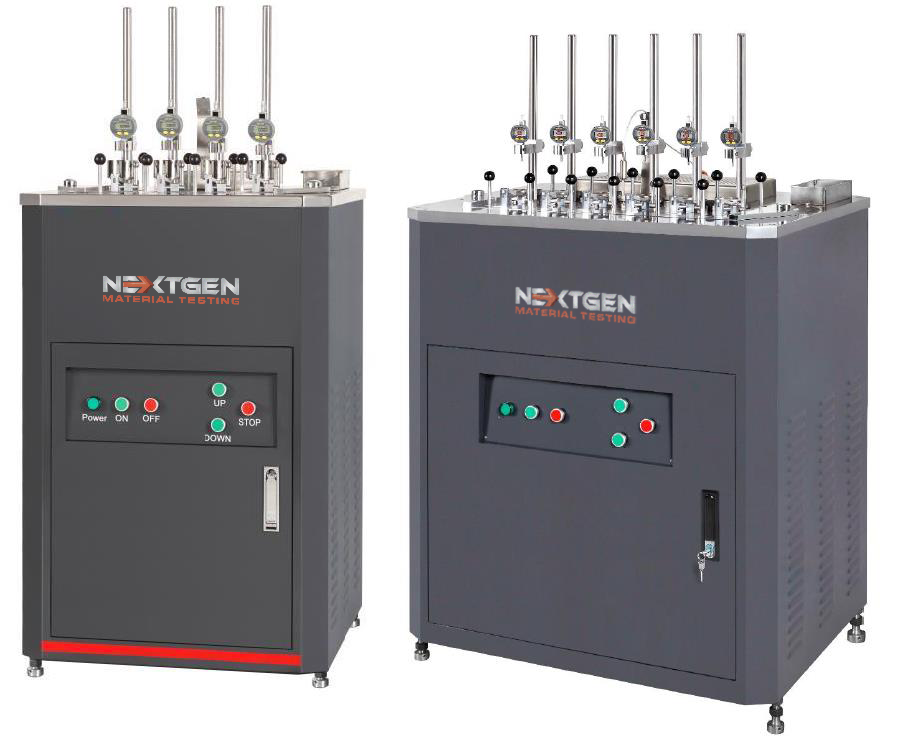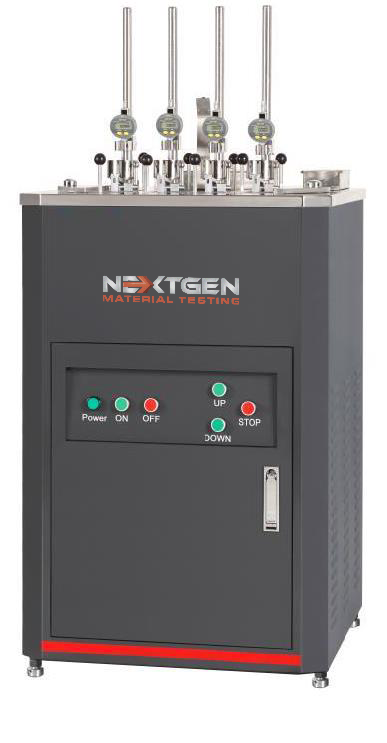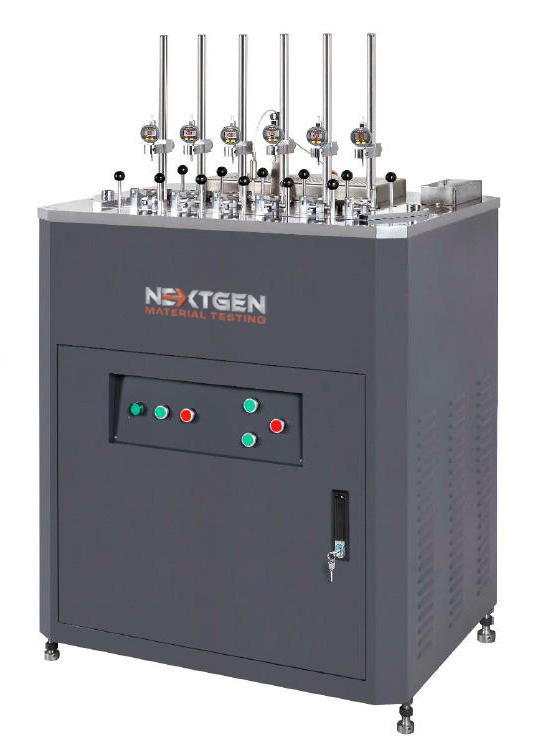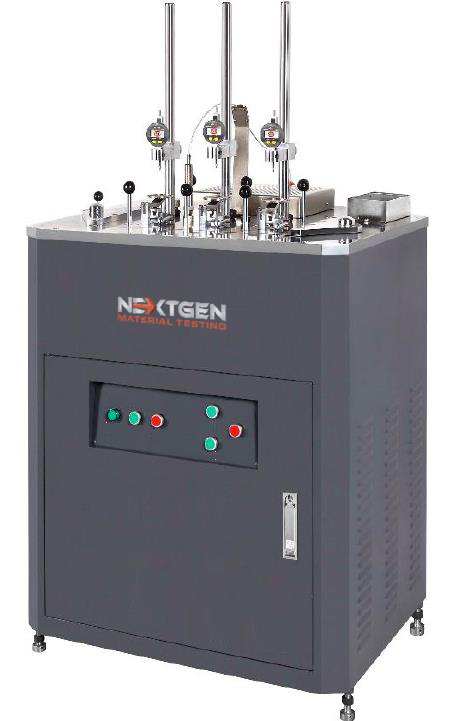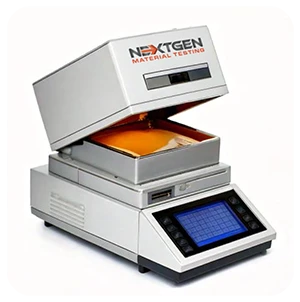The NG-HDT is configured so that HDT and Vicat specimens can be placed in the same heated oil bath at the same time. Each test station is equipped with its own loading system and deformation sensor, while all stations share the controlled bath environment. With programmable cycles, the software manages both procedures in parallel, allowing laboratories to obtain HDT and Vicat results in a single run. This setup shortens testing time and raises throughput without sacrificing measurement accuracy.
Metal Testing Equipment
Standards
ISO 2507, ISO 75, ISO 306, ASTM D648, ASTM D1525, GB/T 8802, GB/T 1633, GB/T 1634






Description
The HDT/VICAT testing machine offers high precision, reliability, and efficiency for the thermal analysis of thermoplastics and polymers. Engineered with advanced sensors and high-temperature-resistant components, it ensures minimal deformation, fast response, and precise data transmission, delivering consistent and accurate test results. When integrated with a chiller system, testing capacity doubles, significantly enhancing productivity.
The test station, made from a low-expansion coefficient alloy, maintains measurement accuracy up to 200°C without recalibration, complying with international standards. Widely used for HDT and Vicat softening temperature testing, this HDT/VICAT machine is essential for plastic and pipe manufacturers, quality control laboratories, construction engineering, and research institutions. Designed for product development, material testing, and regulatory compliance, it is a crucial tool for manufacturers, quality assurance teams, and research professionals seeking precise and efficient thermal analysis solutions.
HDT/Vicat Testing Machine Features
-
Simultaneous HDT and VICAT Testing – Conduct both tests at the same time, improving efficiency and throughput.
-
High-Stability Test Station – Minimal deformation under heat, with deflection temperature accuracy up to 200°C without recalibration.
-
Automatic Loading & Lifting – Eliminates manual weight handling for easier and more efficient operation.
-
Compact & Cost-Effective Design – Tank volume is reduced by over 50%, significantly lowering operational costs compared to traditional designs.
-
Precision Displacement Measurement – Swiss-made high-precision micrometer ensures exceptional accuracy and stability.
-
Multi-Station Capability – Supports up to six test stations, with up to six deformation transducers and one temperature transducer for precise monitoring.
-
Motor-Driven Test Stations – Easily raise stations from the bath at the touch of a button, simplifying specimen placement.
-
Fully Automated Testing Process – Once the software is started, the test runs automatically according to user-defined parameters.
-
Automatic Bath Cooling – After test completion, the system cools the bath to 280°C, improving equipment utilization for continuous testing.
-
User-Friendly Software – Professional testing software with an intuitive interface for easy operation and data management.
Optimized Cooling System for Maximum Efficiency
Equipping the HDT/VICAT testing machine with a chiller system significantly enhances cooling performance, reducing downtime and increasing operational efficiency. Compared to traditional cooling methods, this advanced system offers several key advantages:
-
High Initial Cooling Temperature – The system supports an initial cooling temperature of up to 280°C, ensuring rapid heat dissipation.
-
Fast Cooling Speed – When used with a chiller, cooling time is reduced to just 45 minutes, dramatically improving equipment utilization and workflow efficiency.
-
Optimized Temperature Control – The chiller lowers the oil temperature to below 25°C, minimizing test errors and ensuring compliance with ISO and ASTM standards for initial heating temperatures.
-
Water-Saving Design – The water chiller recycles water, significantly reducing water consumption while maintaining effective cooling.
Test Station
-
Flexible Test Configurations – Available with 3, 4, or 6 test stations to accommodate different testing needs.
-
Precision Loading System – Includes 10N and 50N dead weights for accurate load application.
-
Ultra-Accurate Deformation Measurement – Swiss-made high-precision micrometer with 0.001mm resolution and ±0.005mm accuracy ensures precise specimen deformation analysis.
-
High-Accuracy Temperature Control – Japan-made RKC temperature controller with ±0.5°C accuracy guarantees consistent thermal conditions.
-
Invar Steel Test Station Assembly – Constructed from low-expansion Invar Steel, minimizing deformation at high temperatures for exceptional test stability and accuracy.
Technical Specifications
| Model | NG-HDT300 | NG-HDT400 | NG-HDT600 |
| Type | A | B | C |
| Test station | 3 | 4 | 6 |
| Immersion bath | 1 | 1 | 1 |
| Heat transfer medium |
Methyl Silicon oil,22 liter Viscosity: 300 cSt, or 300 mm2/s Silicon oil brand: DON CORNING PMX-200 350 cSt, KF96-300 Or transformer oil, 10#, 22 liter |
||
| Temperature sensor | 3 | 4 | 6 |
| Temperature range |
Ambient (20℃)-300℃ |
||
| Temperature accuracy |
±0.5℃ |
||
| Heating Speed | Speed A:
5±0.5℃/6min Speed B: 12±1℃/6min |
||
| Micrometer | 3 | 4 | 6 |
| Deformation measurement range | 0-10mm | ||
| Deformation resolution | 0.001mm | ||
| Deformation measurement accuracy | 0.003mm | ||
| Vicat loading capacity |
GA=10N±0.2N, GB=50N±1N |
||
| Deformation measurement range | 0-10mm | ||
| HDT Test |
Method A: USE FIBRE STRESS 1.80Mpa Method B: USE FIBRE STRESS 0.45Mpa Method C: USE FIBRE STRESS 8.00Mpa |
||
| HDT Test Span |
Outer span: 100mm, ASTM D648 Inner span: 64mm, ISO 75 |
||
| Maximum heating power | 5000W | ||
| Power requirements |
220V 50/60Hz 3 Phase |
||
| Dimensions | 32" x 24.5" x 28.5" | ||
| Weight | 253 lbs | 253 lbs | 617 lbs |
| Cooling |
Nature cooling or water cooling (less than 150℃) |
||
Standard Accessories
| Model | NG-HDT300 | NG-HDT400 | NG-HDT600 |
| Type | A | B | C |
| Main Frame | 1 set | 1 set | 1 set |
| Test Stations | 3 | 4 | 6 |
| Swiss-made Micrometers | 3 sets | 4 sets | 6 sets |
| Platinum resistance temperature sensors | 3 sets | 4 sets | 6 sets |
| Temperature controllers | 3 sets | 4 sets | 6 sets |
| Loading nose for HDT | 3 sets | 4 sets | 6 sets |
| Needle for VICAT | 3 sets | 4 sets | 6 sets |
| Weight set (10N, 50N) | 3 sets | 4 sets | 6 sets |
| Test software | 1 set | 1 set | 1 set |
FAQs
The NG-HDT is a thermal analysis instrument developed for plastics and polymers. It performs both Heat Deflection Temperature (HDT) and Vicat Softening Temperature (VST) tests, giving data on how materials behave when exposed to rising heat under load. These values are critical for qualifying polymers, comparing formulations, and checking if materials meet regulatory or customer specifications. The system is applied in quality control labs, production environments, and R&D to confirm product reliability and to support material development.
Click here to learn more about the product or here to receive a personalized quote.
The NG-HDT uses test stations built from Invar steel, a low-expansion alloy that keeps dimensional stability even when exposed to high heat. This material choice minimizes thermal deformation, so measurements remain consistent up to 300 °C. Stable load fixtures hold specimens firmly, preventing shifts that could affect deflection readings. Critical components such as displacement sensors and temperature probes are selected for high-temperature tolerance, allowing the system to deliver precise results over repeated heating cycles.
Click here to learn more about the product or here to receive a personalized quote.
The NG-HDT covers the main global methods for HDT and Vicat testing. It supports ISO 75 for heat deflection, ISO 306 for Vicat softening, ASTM D648 for HDT, ASTM D1525 for Vicat, ISO 2507 for thermoplastic pipes and fittings, as well as GB/T 1633, GB/T 1634, and GB/T 8802. With this range, users can run tests that match the requirements of international product certification and industry regulations.
Click here to learn more about the product or here to receive a personalized quote.
In the Vicat method, a flat-ended needle is pressed into the surface of a plastic specimen under a defined load. The sample is heated at a uniform rate, and the test ends once the needle penetrates to a depth of 1 mm. The recorded temperature is the Vicat softening temperature, showing the point where the material transitions from rigid to softened under heat.
Click here to learn more about the product or here to receive a personalized quote.
In the HDT method, a specimen is placed on a three-point bending fixture and subjected to a constant load. The surrounding bath is then heated at a controlled rate. The test records the temperature at which the specimen bends to a defined deflection under the applied stress. This temperature is known as the heat deflection temperature, and it indicates the upper service limit of plastics when carrying mechanical loads in heated environments.
Click here to learn more about the product or here to receive a personalized quote.
The NG-HDT is built for thermal analysis of thermoplastics and engineering plastics, covering both unfilled and reinforced grades. It handles general-purpose polymers such as polyethylene, polypropylene, and PVC, as well as engineering materials like polyamides, polyacetals, and polycarbonates. Filled plastics with glass or mineral reinforcement can also be tested to evaluate how additives affect heat resistance. In addition, the system supports composites and specialty polymers, giving laboratories a way to compare different formulations and confirm material suitability for demanding applications.
Click here to learn more about the product or here to receive a personalized quote.
HDT/VICAT machines are applied wherever thermoplastics and polymers must be verified for performance under heat. Plastics manufacturers rely on them to qualify raw materials and finished goods. The pipe and profile industry uses them to certify pressure pipes and structural profiles before distribution. Automotive suppliers apply HDT and Vicat tests to evaluate polymers used in under-the-hood parts, housings, and interior components. In construction, the method helps validate plastic pipes, fittings, and panels for long-term service. Research and development laboratories use these tests for new material formulations and compliance studies.
Click here to learn more about the product or here to receive a personalized quote.
The NG-HDT has a footprint of approximately 32 × 24.5 × 28.5 inches (815 × 620 × 725 mm). The smaller configurations, such as the 3- and 4-station models, weigh about 253 lbs (115 kg), while the larger 6-station system reaches around 617 lbs (280 kg). This compact yet solid construction allows the unit to fit into standard laboratory spaces while offering the stability required for high-precision thermal testing.
Click here to learn more about the product or here to receive a personalized quote.
The NG-HDT requires a three-phase 220 V, 50/60 Hz power connection to operate. Its maximum heating power is rated at 5000 W, giving it enough capacity to maintain stable high-temperature conditions even when running multiple test stations in parallel. A dedicated three-phase line is recommended in laboratories to handle the load safely and prevent voltage fluctuations during testing.
Click here to learn more about the product or here to receive a personalized quote.
The NG-HDT supports several cooling approaches. For standard use, natural cooling can be applied once the heating cycle is finished. For faster cycles, water cooling is available when the bath temperature is below 150 °C. In addition, the system can be paired with an external chiller, which lowers the oil temperature to below 25 °C, shortens turnaround times, and keeps results within the limits defined by ISO and ASTM requirements.
Click here to learn more about the product or here to receive a personalized quote.
The NG-HDT uses Swiss-made micrometers with a resolution of 0.001 mm and a measurement accuracy of ±0.003 mm. This level of precision allows laboratories to detect very small changes in specimen deflection under load, which is critical when determining HDT and Vicat softening points.
Click here to learn more about the product or here to receive a personalized quote.
The NG-HDT system uses either methyl silicon oil or transformer oil as the heat transfer medium. For silicon oil, a viscosity grade of about 300 cSt (for example, Dow Corning PMX-200 or KF96-300) is recommended to achieve stable thermal performance. The bath requires a volume of 22 liters, giving enough capacity to keep temperature gradients low during long test cycles. Using these oils provides consistent heating and cooling.
Click here to learn more about the product or here to receive a personalized quote.
The NG-HDT immersion bath works from ambient levels (around 20 °C) up to 300 °C. Temperature stability is maintained within ±0.5 °C across the entire range, which is critical for reliable HDT and Vicat testing. The bath uses 22 liters of silicone or transformer oil as the heat transfer medium, providing uniform heating and minimizing thermal gradients. This capacity and control allow consistent evaluation of thermoplastics, pipes, and engineering polymers that require precise high-temperature testing.
Click here to learn more about the product or here to receive a personalized quote.
The NG-HDT system provides two standard loading options with 10 N and 50 N dead weights, covering both HDT and Vicat methods. The machine features an automatic loading and lifting mechanism that removes the need for manual weight handling, making the operation faster and reducing operator fatigue. Fixtures are designed to hold specimens securely during heating.
Click here to learn more about the product or here to receive a personalized quote.
The NG-HDT series is offered in three versions: a 3-station unit, a 4-station unit, and a 6-station unit. This flexibility allows laboratories to choose a setup that matches their workload. Multi-station configurations make it possible to run several specimens in parallel, improving throughput and reducing overall testing time.
Click here to learn more about the product or here to receive a personalized quote.
The NG-HDT machine integrates multiple safeguards to keep both operators and samples protected. It has overload protection to prevent mechanical strain, temperature limit controls to avoid overheating, and an automatic shutdown system that activates in case of abnormal operation. The test chamber is enclosed in a stable structure that shields users from heat exposure while keeping specimens in controlled conditions. Together, these measures provide safe day-to-day use in research and quality control labs.
Click here to learn more about the product or here to receive a personalized quote.
The NG-HDT machine is supplied with warranty coverage for both mechanical and electrical components, giving users confidence in long-term operation. Technical service is available to assist with installation, training, and troubleshooting. Spare parts are kept in stock for fast replacement, and calibration services are offered to keep the system performing to standard requirements
Click here to learn more about the product or here to receive a personalized quote.
Yes, the NG-HDT is designed to follow ISO 2507, which specifies how to determine the Vicat softening temperature of thermoplastic pipes and fittings. This test identifies the temperature at which the material begins to soften under a defined load and heating rate.
For plastic pipe manufacturers and quality control labs, ISO 2507 is a key benchmark. It helps confirm whether pipes and fittings can handle the thermal stress they will face during installation and service. By applying this method on the NG-HDT, users can verify compliance with product standards and demonstrate durability for building and infrastructure applications.
Click here to learn more about the product or here to receive a personalized quote.
Yes, the NG-HDT supports ISO 75, the standard that defines how to measure the heat deflection temperature (HDT) of plastics. The test records the temperature at which a plastic sample bends under a specified load.
ISO 75 is important for pipe makers, construction material suppliers, and plastic processors, as it shows how materials behave under mechanical stress at elevated temperatures. Using the NG-HDT, labs can follow this method to check whether plastics maintain their strength and shape within the required temperature range.
Click here to learn more about the product or here to receive a personalized quote.
Yes, the NG-HDT machine is designed to perform tests according to ISO 306, which specifies the Vicat softening temperature (VST) of plastics. This method measures the temperature at which a flat-ended needle penetrates the specimen to a standard depth under a defined load, providing a benchmark of when a plastic starts to soften.
ISO 306 is widely applied across the plastics and polymer industry, especially for materials used in construction, piping, insulation, and consumer goods, where heat resistance is a critical property. Running ISO 306 on the NG-HDT system gives manufacturers and laboratories reliable data on material performance, enabling material comparison, product development, and compliance with international requirements.
Click here to learn more about the product or here to receive a personalized quote.
Yes, the NG-HDT system supports ASTM D648, the standard test method for determining the heat deflection temperature (HDT) of plastics under flexural load. In this method, a specimen is placed under a specified stress, heated at a controlled rate, and the temperature at which it reaches a set deflection is recorded.
ASTM D648 is one of the most frequently applied standards in plastics, pipe manufacturing, and engineering design, since it provides a clear measure of how materials behave under mechanical stress at elevated temperatures. By working in line with ASTM D648, the NG-HDT allows laboratories and production facilities to qualify materials for high-temperature use, compare grades of thermoplastics, and validate performance for regulatory and customer specifications.
Click here to learn more about the product or here to receive a personalized quote.
Yes, the NG-HDT complies with ASTM D1525, the international standard for determining the Vicat softening temperature of plastics. This method uses a needle-shaped indenter under a constant load to measure the temperature at which the material begins to soften.
ASTM D1525 is widely used in quality control and material selection because it helps manufacturers evaluate the heat resistance of thermoplastics. It is especially relevant in industries such as construction, automotive, and electrical applications, where materials must maintain integrity when exposed to elevated temperatures. With compliance to ASTM D1525, the NG-HDT provides reliable data for certifying materials and comparing them with results obtained under ISO 306 or GB/T 8802 procedures.
Click here to learn more about the product or here to receive a personalized quote.
Yes, the NG-HDT system conforms to GB/T 8802, a standard that specifies the method for determining the Vicat softening temperature (VST) of plastics. This procedure measures the temperature at which a flat-ended needle penetrates a plastic specimen to a set depth under a defined load, helping evaluate material softening behavior under heat.
The Vicat softening point is an important benchmark for comparing different thermoplastics and for selecting materials suitable for high-temperature environments such as hot water piping, electrical housings, and automotive components.
Click here to learn more about the product or here to receive a personalized quote.
Yes, the NG-HDT is built to meet GB/T 1633, a standard that defines the method for determining the heat deflection temperature (HDT) of plastics. The test measures the temperature at which a plastic specimen deforms under a specified load, providing a critical parameter for assessing thermal performance.
This standard is essential for evaluating the service temperature limits of thermoplastics used in construction, piping, automotive, and electrical applications. With GB/T 1633 compliance, the NG-HDT allows laboratories and manufacturers to confirm material reliability, align with national regulations, and generate data directly comparable to other global HDT methods such as ISO 75 and ASTM D648.
Click here to learn more about the product or here to receive a personalized quote.
Yes, the NG-HDT is fully compliant with GB/T 1634, a standard that specifies the method for determining the Vicat softening temperature (VST) of plastics. This procedure measures the temperature at which a standard needle penetrates a plastic specimen to a defined depth under a specified load, giving a clear benchmark for material softening under heat.
GB/T 1634 is widely used by plastic manufacturers, quality control laboratories, and research institutes in China to qualify materials for piping, automotive parts, and consumer products. By following this method on the NG-HDT, companies can verify that thermoplastics meet national compliance requirements, compare the softening behavior of different product batches, and support certification processes for both domestic and export markets.
Click here to learn more about the product or here to receive a personalized quote.
Related Products
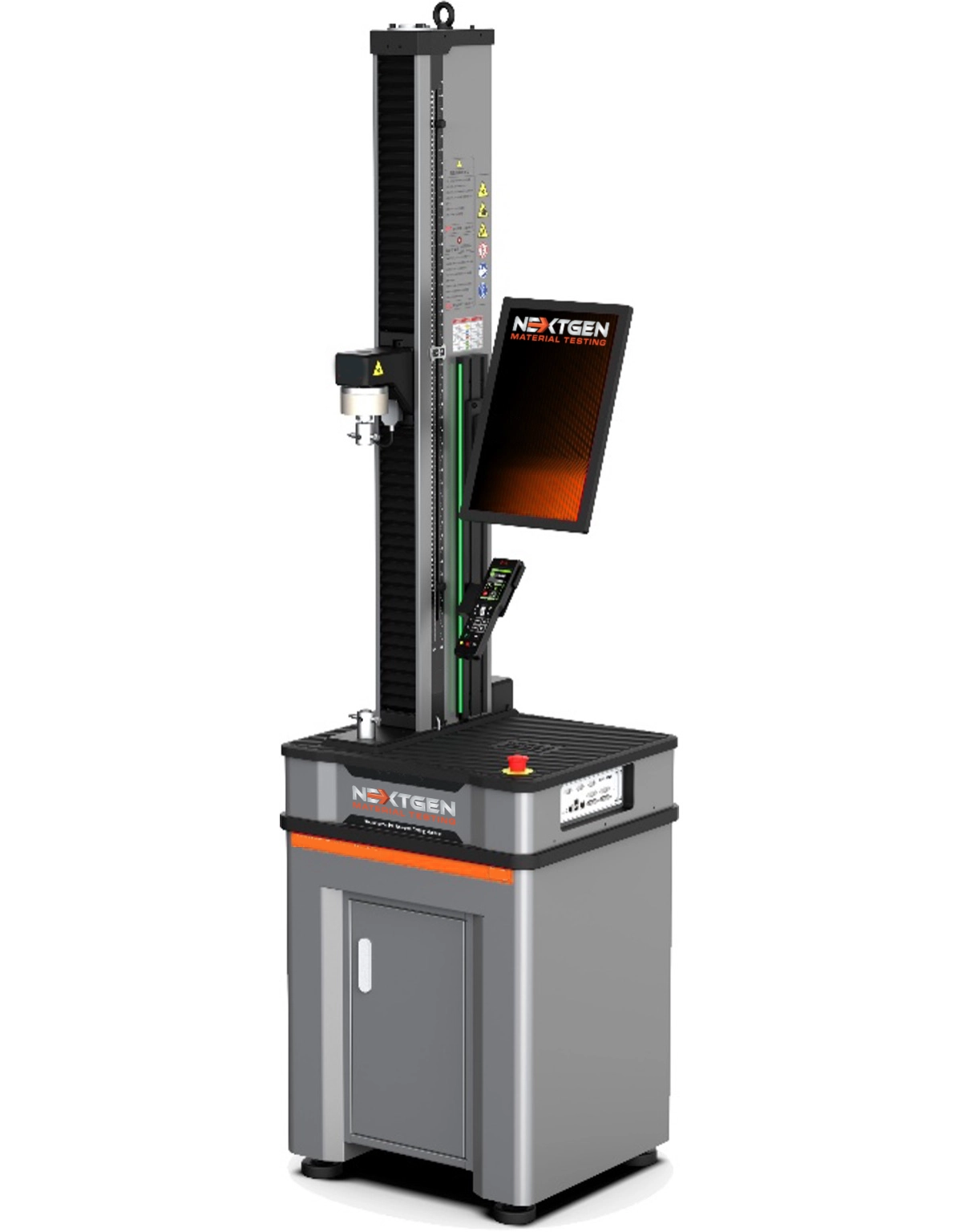
NG-EML Series A – Single Column Bench Top Universal Testing Machine (50 N – 5 kN)
The NG-EML Series A – Single Column Bench Top UTM (50 N–5 kN) is a precision electromechanical system designed for tension, compression, and flexural testing of low-force specimens. Featuring GenTest™ software, a high-speed servo drive, Class 0.5 accuracy, and USB/Ethernet control, this compact tabletop unit supports ASTM, ISO, and EN standards. Ideal for testing plastics, rubber, foams, films, composites, and thin metals.
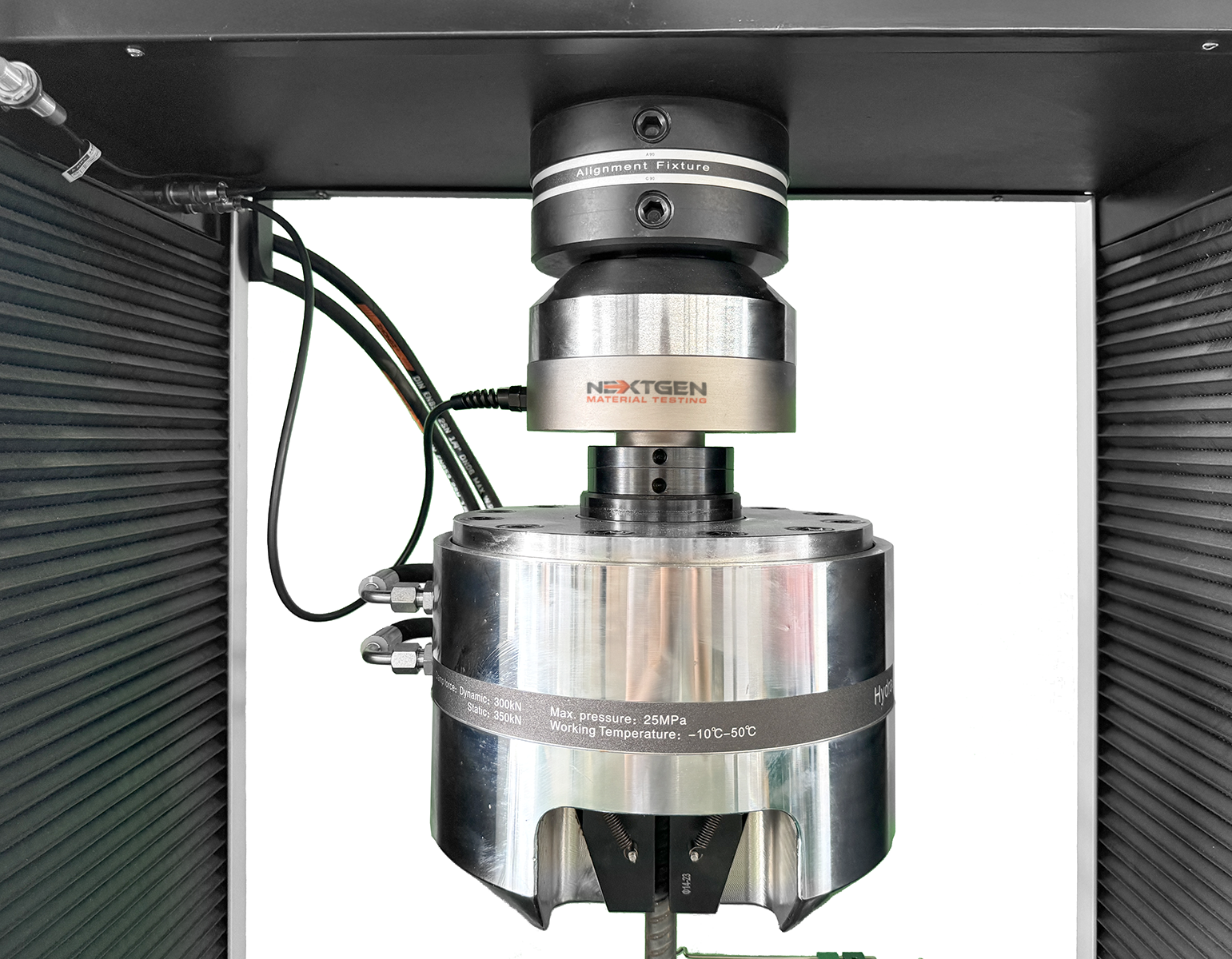
Alignment Device
(NADCAP-Ready Precision Fixture)
NextGen Material Testing’s Alignment Device is a precision-engineered fixture designed to ensure perfect axial alignment in universal testing machines.
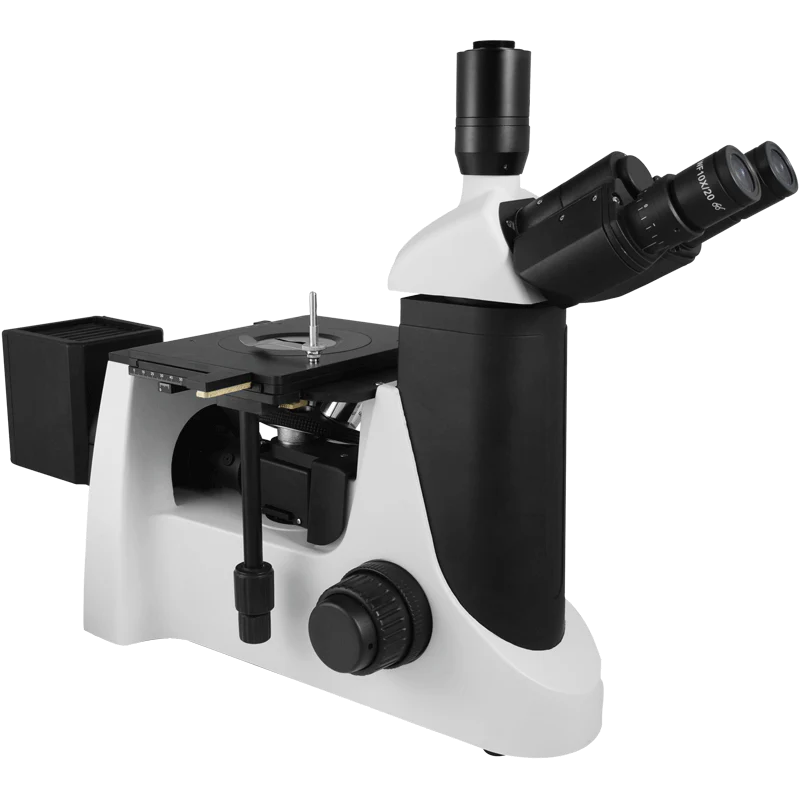
G-800E Trinocular Metallurgical Microscope
This inverted metallurgical trincoular microscope is ideal for both industrial or educational metallurgy applications.
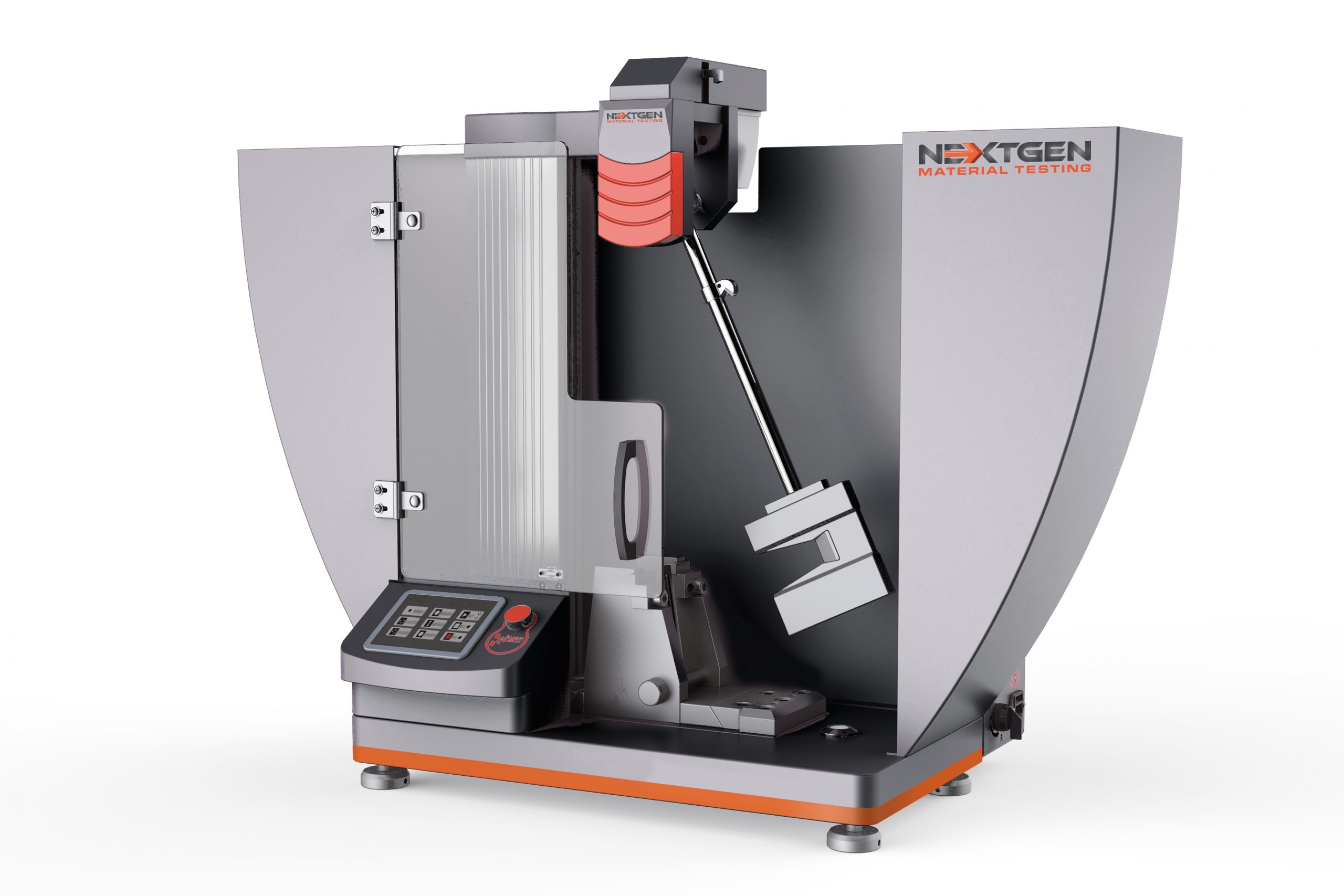
Class J - Charpy and Izod Automatic Impact Testing System - 1J - 50J
Class J is widely used for lzod and Charpy impact test on softer metals, plastics and rubber specimens. Equipped with tensile impact pendulum and fixtures, it can carry on tests on plastic film and sheet. The newly enhanced design offers the most cost-effective configuration to address Charpy test from 1J to 50J (0.7 - 37 ft/lbs), and lzod test from 1J to 22J (0.7 - 16 ft/lbs).
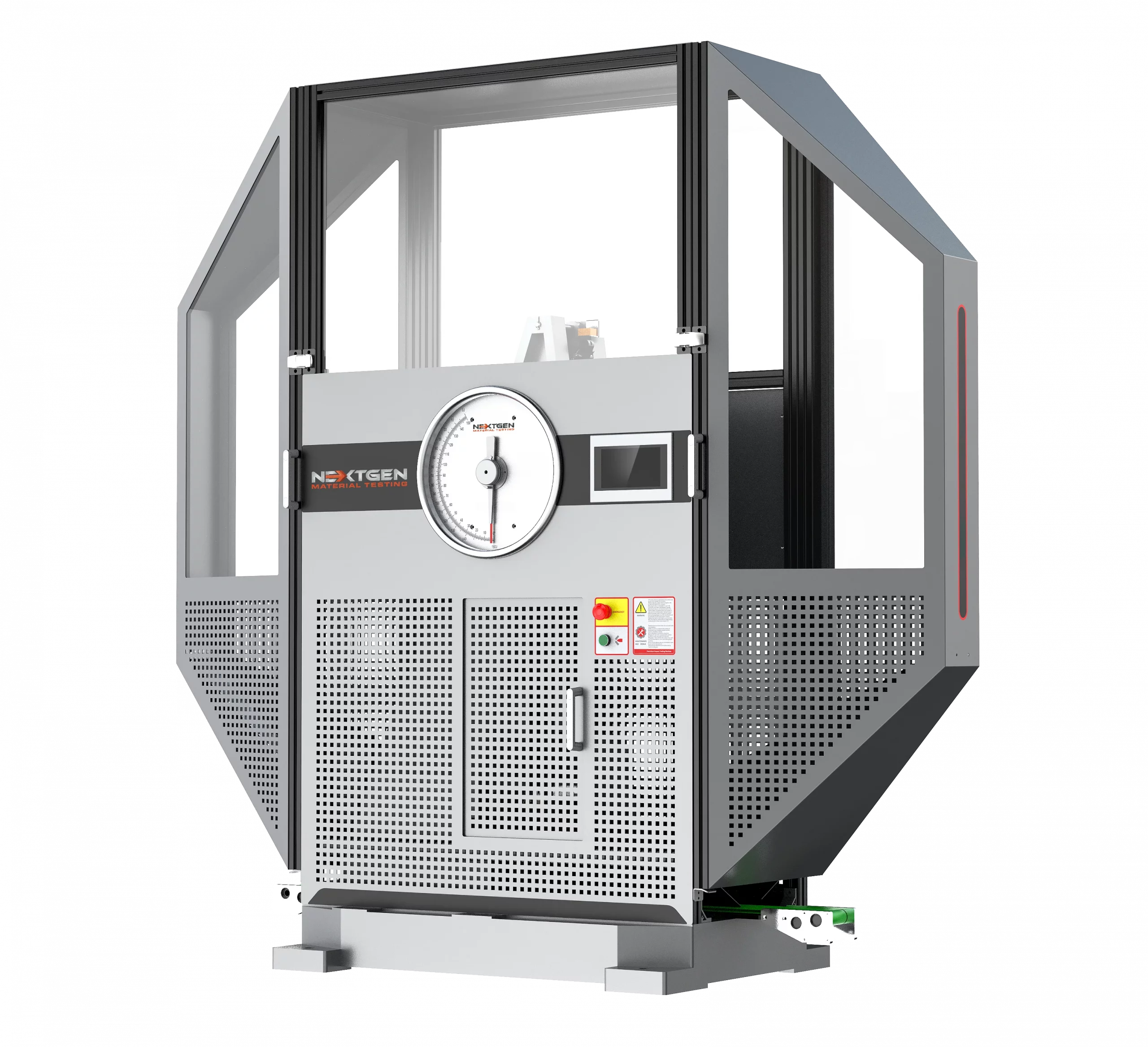
Class D Single-Column Charpy Impact Tester – High-Precision Pendulum Testing Machine
NextGen’s Class D Single-Column Charpy Impact Testing System is built for high rigidity and dependable specimen testing across a wide energy range. It supports impact energies from around 150 J (111 ft-lbs) up to around 750 J (553 ft-lbs), covering most standard metal testing needs. The unit includes a digital display and offers a software upgrade option for data plotting. Additional features, such as automated specimen feeding and integrated cooling or heating systems, are available as optional enhancements.
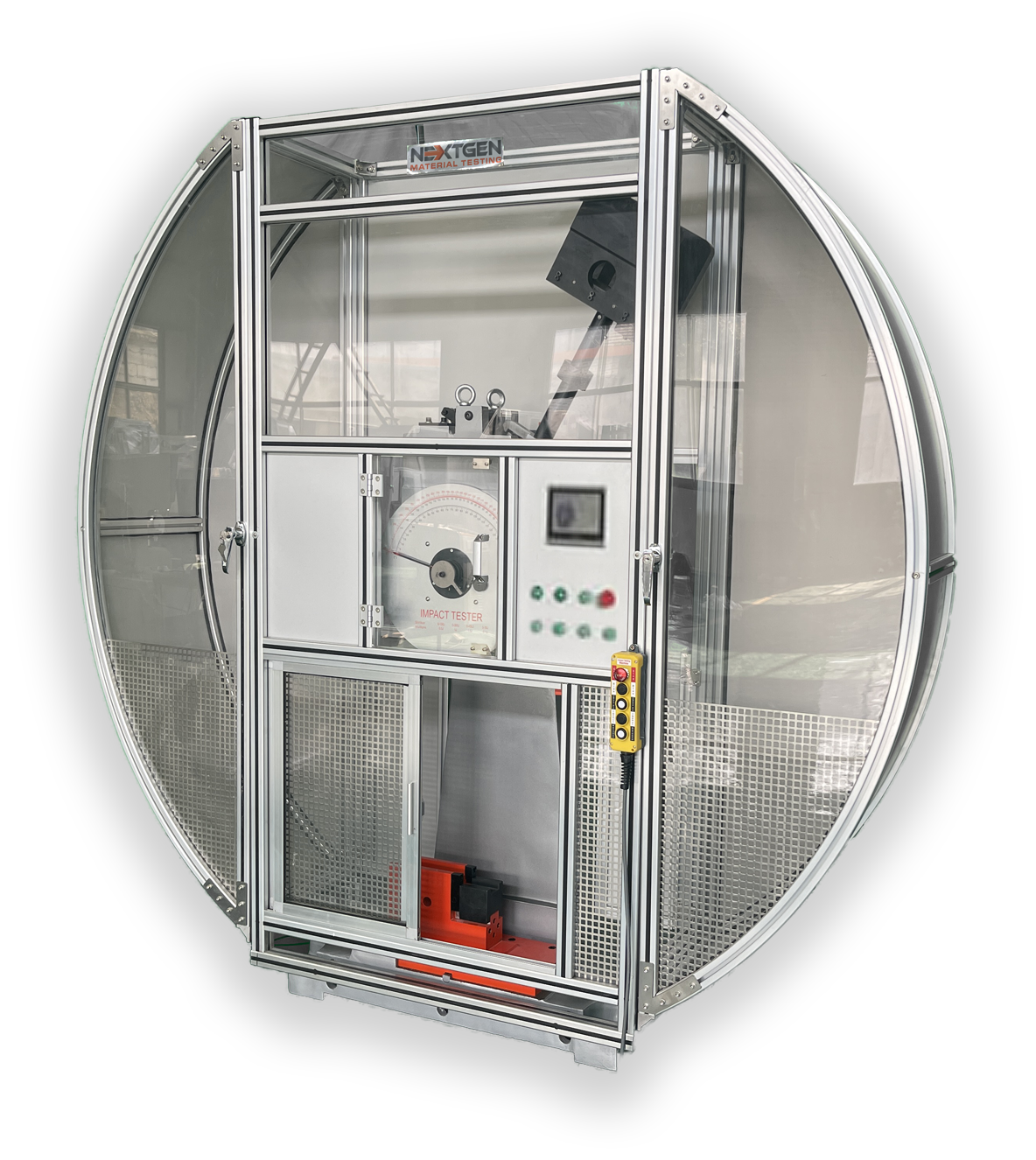
Class G Single-Column Charpy & Izod Impact Tester – High-Precision Pendulum Testing Machine
NextGen's Class G – Single Column Charpy and Izod Impact Testing system provides a high level of rigidity and specimen testing capacity. This Charpy and Izod Impact tester has a minimum capacity of 150 J (111 ft/lbs) and a maximum capacity of 750 J (553 ft/lbs). The system comes standard with a digital display with software upgrade function for data plotting. The Class G impact system can also include automatic specimen feeding, cooling and heating systems as optional upgrades.
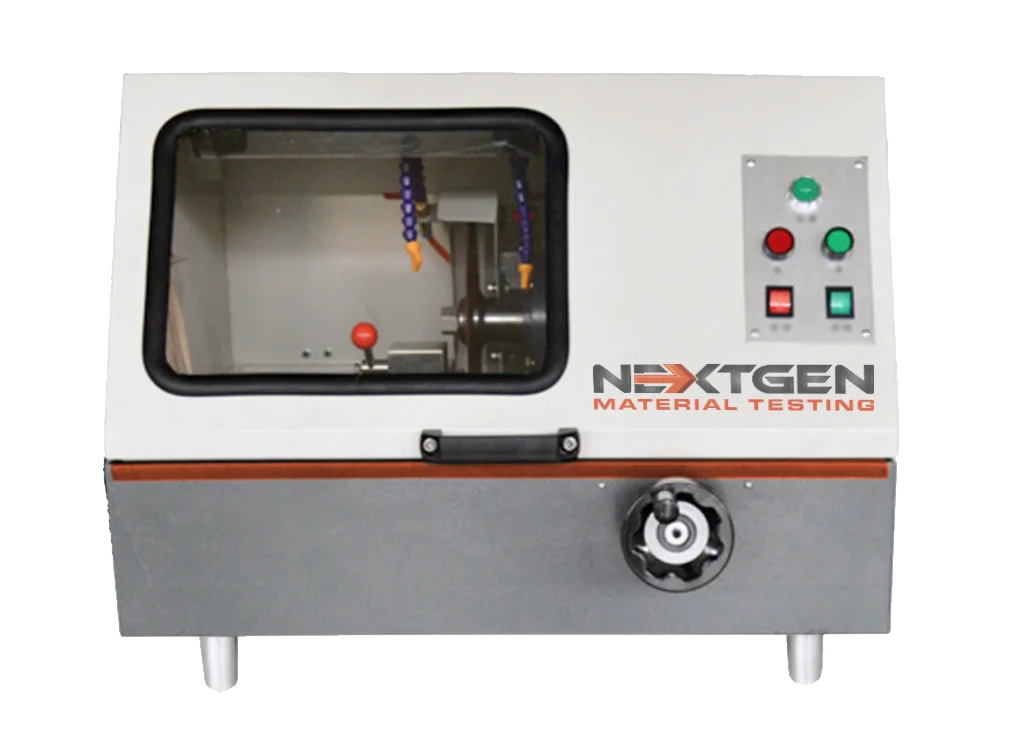
GenCut GL100M – Precision Manual Metallographic Sample Cutting Machine with Simple User-Friendly Operation and Large Cutting Capacity Φ100mm
Introducing the GenCut GL100M Manual Cutting Machine, expertly designed for precision metal sample cutting.
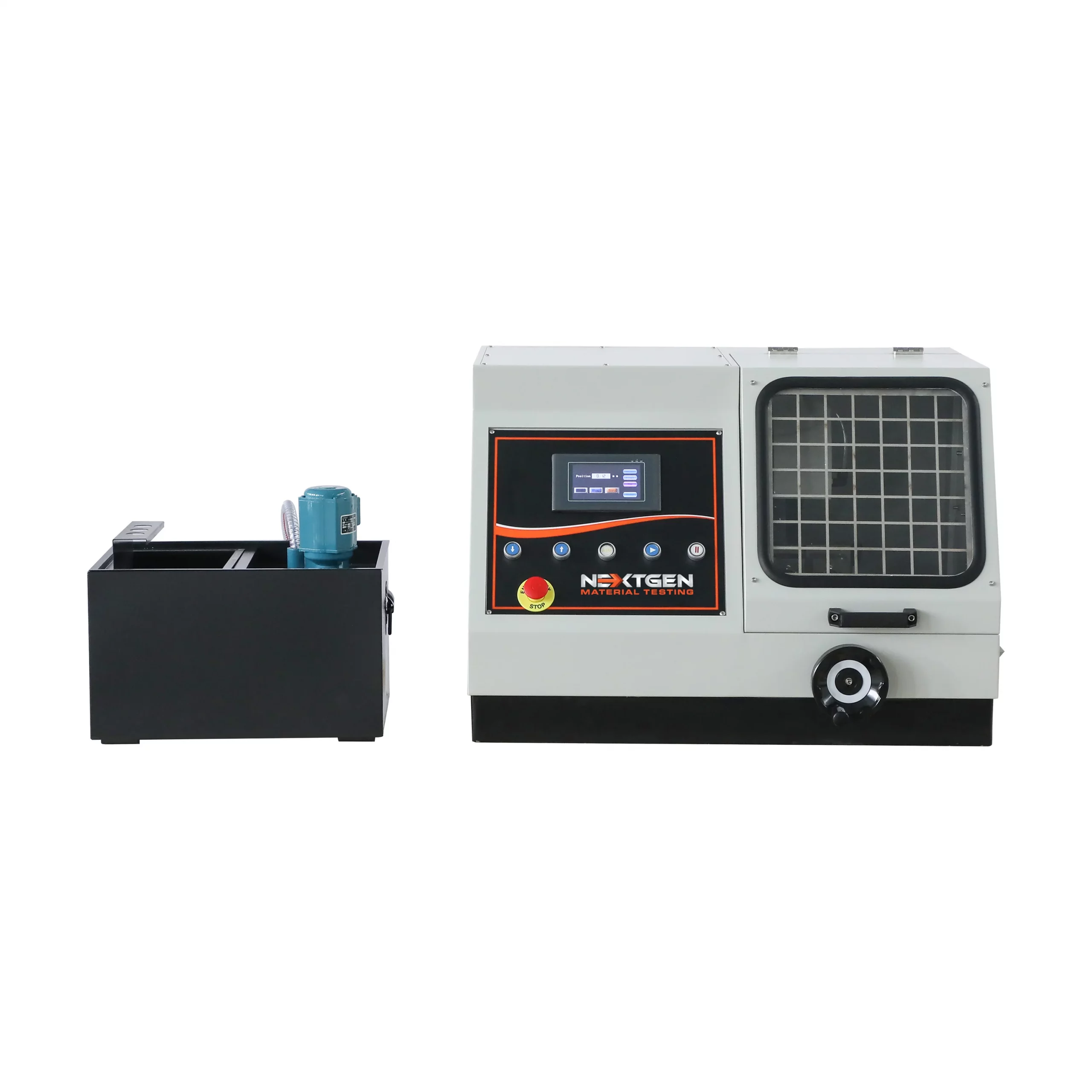
GenCut GL350 – Precision Metallographic Sample Cutting Machine with Simple User-Friendly Operation and Large Cutting Capacity Φ100mm
The GenCut GL350 is a cutting-edge high precision cutting machine equipped with advanced features and capabilities
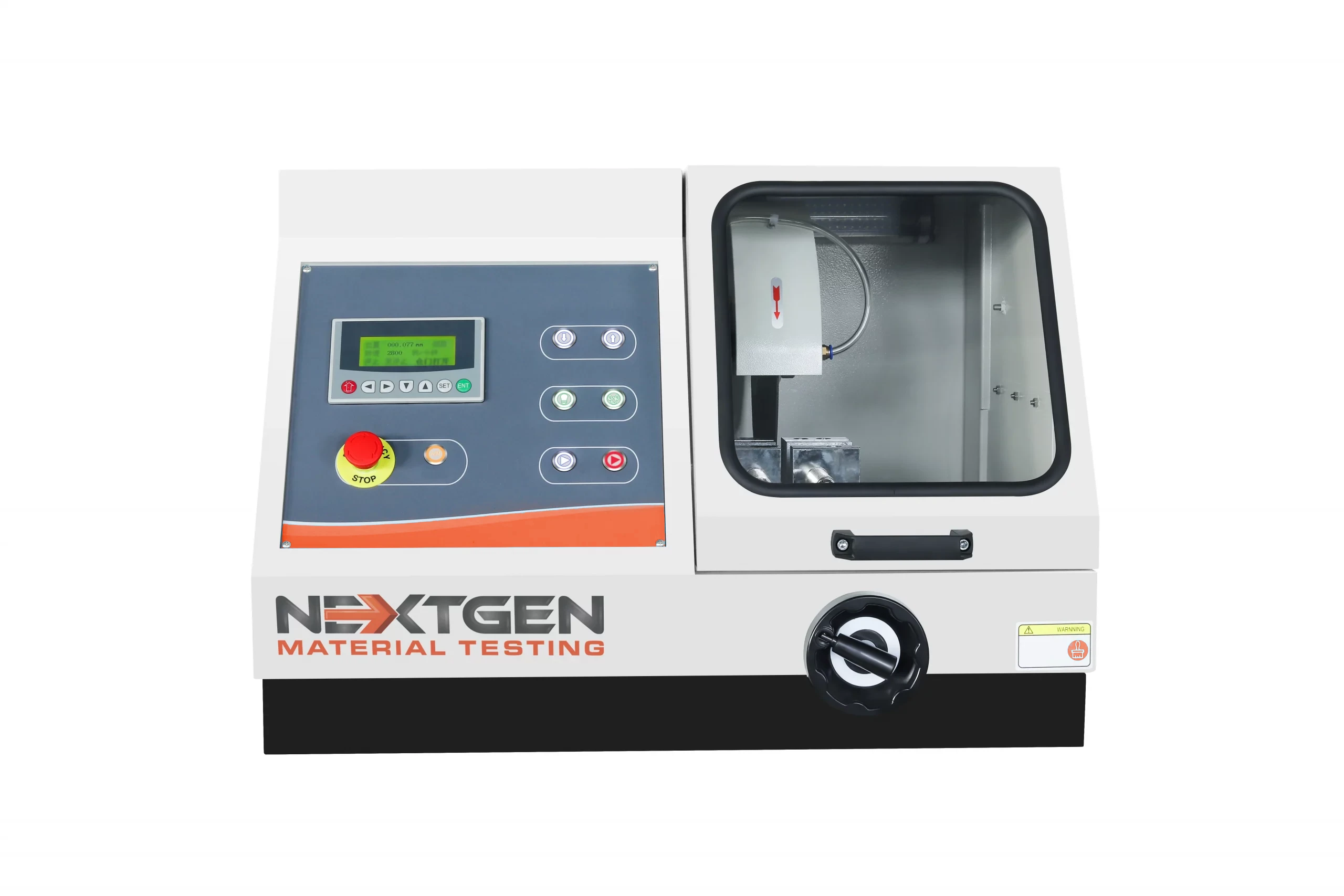
GenCut GL80A – Precision Metallographic Sample Cutting Machine with Simple User-Friendly Operation and Large Cutting Capacity Φ80mm
Introducing the GenCut GL80A, a highly precise cutting machine offering both automatic and manual work modes.

GenCut GL 170XY – Multi Function Abrasive Cut Off Saw with Touch Screen User Friendly Interface and Large Cutting Capacity – Φ170mm
The GenCut GL 170XY has a large 170mm diameter maximum cutting capacity equipped with a fully automated XY table.
